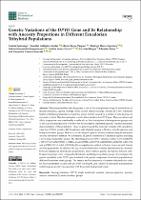| dc.contributor | Vall d'Hebron Barcelona Hospital Campus |
| dc.contributor.author | Farinango, Camila |
| dc.contributor.author | Gallardo-Cóndor, Jennifer |
| dc.contributor.author | Freire Paspuel, Byron |
| dc.contributor.author | Flores-Espinoza, Rodrigo |
| dc.contributor.author | Jaramillo-Koupermann, Gabriela |
| dc.contributor.author | López-Cortés, Andrés |
| dc.date.accessioned | 2022-09-12T09:35:15Z |
| dc.date.available | 2022-09-12T09:35:15Z |
| dc.date.issued | 2022-06-10 |
| dc.identifier.citation | Farinango C, Gallardo-Cóndor J, Freire-Paspuel B, Flores-Espinoza R, Jaramillo-Koupermann G, López-Cortés A, et al. Genetic Variations of the DPYD Gene and Its Relationship with Ancestry Proportions in Different Ecuadorian Trihybrid Populations. J Pers Med. 2022 Jun 10;12(6):950. |
| dc.identifier.issn | 2075-4426 |
| dc.identifier.uri | https://hdl.handle.net/11351/8149 |
| dc.description | Ecuadorian ethnic groups; Fluoropyrimidines; Pharmacogenetics |
| dc.description.abstract | Dihydropyrimidine dehydrogenase is one of the main pharmacological metabolizers of fluoropyrimidines, a group of drugs widely used in clinical oncology. Around 20 to 30% of patients treated with fluoropyrimidines experience severe toxicity caused by a partial or total decrease in enzymatic activity. This decrease is due to molecular variants in the DPYD gene. Their prevalence and allelic frequencies vary considerably worldwide, so their description in heterogeneous groups such as the Ecuadorian population will allow for the description of pharmacogenetic variants and proper characterization of this population. Thus, we genotyped all the molecular variants with a predictive value for DPYD in a total of 410 Ecuadorian individuals belonging to Mestizo, Afro-Ecuadorian, and Indigenous ethnic groups. Moreover, we developed a genetic ancestry analysis using 46 autosomal ancestry informative markers. We determined 20 genetic variations in 5 amplified regions, including 3 novel single nucleotide variants. The allele frequencies for DPYD variants c.1627G>A (*5, rs1801159), c.1129-15T>C (rs56293913), c.1218G>A (rs61622928), rs1337752, rs141050810, rs2786783, rs2811178, and g.97450142G>A (chr1, GRCh38.p13) are significantly related to Native American and African ancestry proportions. In addition, the FST calculated from these variants demonstrates the closeness between Indigenous and Mestizo populations, and evidences genetic divergence between Afro-Ecuadorian groups when compared with Mestizo and Indigenous ethnic groups. In conclusion, the genetic variability in the DPYD gene is related to the genetic component of ancestral populations in different Ecuadorian ethnic groups. The absence and low frequency of variants with predictive value for fluoropyrimidine toxicity such as DPYD *2A, HapB3, and c.2846A>T (prevalent in populations with European ancestry) is consistent with the genetic background found. |
| dc.language.iso | eng |
| dc.publisher | MDPI |
| dc.relation.ispartofseries | Journal of Personalized Medicine;12(6) |
| dc.rights | Attribution 4.0 International |
| dc.rights.uri | http://creativecommons.org/licenses/by/4.0/ |
| dc.source | Scientia |
| dc.subject | Càncer - Tractament |
| dc.subject | Antimetabòlits - Efectes secundaris |
| dc.subject | Genètica |
| dc.subject.mesh | Antimetabolites, Antineoplastic |
| dc.subject.mesh | /adverse effects |
| dc.subject.mesh | Genetic Variation |
| dc.subject.mesh | Neoplasms |
| dc.title | Genetic Variations of the DPYD Gene and Its Relationship with Ancestry Proportions in Different Ecuadorian Trihybrid Populations |
| dc.type | info:eu-repo/semantics/article |
| dc.identifier.doi | 10.3390/jpm12060950 |
| dc.subject.decs | antimetabolitos antineoplásicos |
| dc.subject.decs | /efectos adversos |
| dc.subject.decs | variación genética |
| dc.subject.decs | neoplasias |
| dc.relation.publishversion | https://doi.org/10.3390/jpm12060950 |
| dc.type.version | info:eu-repo/semantics/publishedVersion |
| dc.audience | Professionals |
| dc.contributor.organismes | Institut Català de la Salut |
| dc.contributor.authoraffiliation | [Farinango C, Gallardo-Cóndor J] Facultad de Ingeniería y Ciencias Aplicadas, Universidad de Las Américas, Quito, Ecuador. [Freire-Paspuel B] Laboratorios de Investigación, Universidad de Las Américas, Quito, Ecuador. Vall d’Hebron Institut de Recerca (VHIR), Barcelona, Spain. Vall d’Hebron Hospital Universitari, Barcelona, Spain. [Flores-Espinoza R] Laboratorios de Investigación, Universidad de Las Américas, Quito, Ecuador. Laboratório de Diagnóstico por DNA (LDD), Universidade do Estado do Rio de Janeiro, Rio de Janeiro, Brazil. [Jaramillo-Koupermann G] Laboratorio de Biología Molecular, Subproceso de Anatomía Patológica, Hospital de Especialidades Eugenio Espejo, Quito, Ecuador. [López-Cortés A] Escuela de Medicina, Facultad de Ciencias de la Salud, Universidad de Las Américas, Quito, Ecuador. Programa de Investigación en Salud Global, Facultad de Ciencias de la Salud, Universidad Internacional SEK, Quito, Ecuador. Latin American Network for the Implementation and Validation of Clinical Pharmacogenomics Guidelines (RELIVAF-CYTED), Madrid, Spain |
| dc.identifier.pmid | 35743735 |
| dc.identifier.wos | 000816343500001 |
| dc.rights.accessrights | info:eu-repo/semantics/openAccess |

